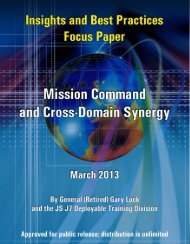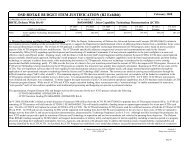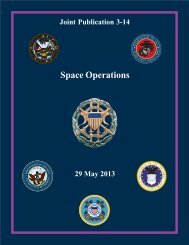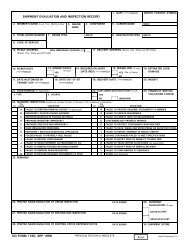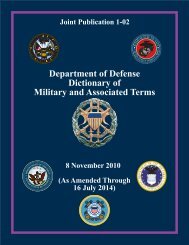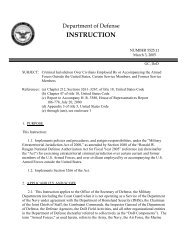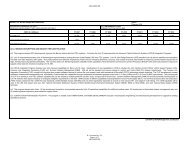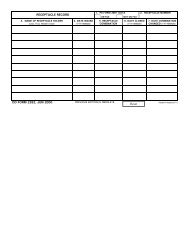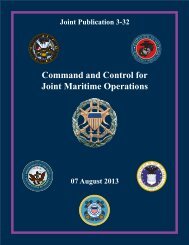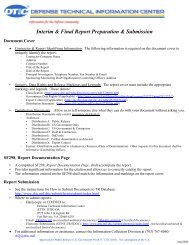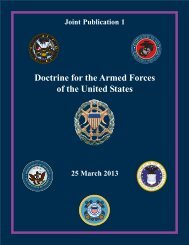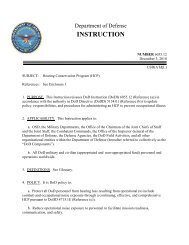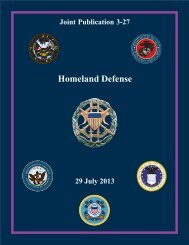JP 3-16, Multinational Operations - Defense Technical Information ...
JP 3-16, Multinational Operations - Defense Technical Information ...
JP 3-16, Multinational Operations - Defense Technical Information ...
You also want an ePaper? Increase the reach of your titles
YUMPU automatically turns print PDFs into web optimized ePapers that Google loves.
Fundamentals of <strong>Multinational</strong> <strong>Operations</strong><br />
3. Nature of <strong>Multinational</strong> <strong>Operations</strong><br />
After World War II, General Dwight D. Eisenhower noted that “mutual confidence” is<br />
the “one basic thing that will make allied commands work.” While the tenets discussed<br />
below cannot guarantee success, ignoring them may lead to mission failure due to a lack of<br />
unity of effort.<br />
a. Respect. In assigning missions and tasks, the commander should consider that<br />
national honor and prestige may be as important to a contributing nation as combat<br />
capability. All partners must be included in the planning process, and their opinions must be<br />
sought in mission assignment. Understanding, discussion, and consideration of partner ideas<br />
are essential to building effective relationships, as are respect for each partner’s culture,<br />
customs, history, and values. Junior officers or even senior enlisted personnel in command<br />
of small national contingents may be the senior representatives of their government within<br />
the MNF and, as such, should be treated with the courtesy and respect afforded the<br />
commanders of other troop contributing nations. Without genuine respect of others, rapport<br />
and mutual confidence cannot exist.<br />
b. Rapport. US commanders and staffs should establish rapport with their counterparts<br />
from partner countries, as well as the multinational force commander (MNFC). This<br />
requires personal, direct relationships that only they can develop. When interacting with<br />
non-English speakers, knowing at least a few phrases and greetings will help establish a<br />
relationship. It is important to remember that eye contact and good listening skills are<br />
essential in building rapport. Therefore, when using an interpreter, focus on the person to<br />
whom the message is being conveyed. Good rapport between leaders will improve<br />
teamwork among their staffs and subordinate commanders and overall unity of effort. The<br />
use of liaisons can facilitate the development of rapport by assisting in the staffing of issues<br />
to the correct group and in monitoring responses.<br />
c. Knowledge of Partners. US commanders and their staffs should have an<br />
understanding of each member of the MNF. Much time and effort is spent learning about the<br />
enemy; a similar effort is required to understand the doctrine, capabilities, strategic goals,<br />
culture, customs, history, and values of each partner. This will facilitate the effective<br />
integration of multinational partners into the operation and enhance the synergistic effect of<br />
their forces.<br />
d. Patience. Effective partnerships take time and attention to develop. Diligent pursuit<br />
of a trusting, mutually beneficial relationship with multinational partners requires untiring,<br />
evenhanded patience. This is more difficult to accomplish within coalitions than within<br />
alliances; however, it is just as necessary. It is therefore imperative that US commanders and<br />
their staffs apply appropriate resources, travel, staffing, and time not only to maintain, but<br />
also to expand and cultivate multinational relationships. Without patience and continued<br />
engagement, established partnerships can easily dissolve.<br />
e. Mission Focus. When dealing with other nations, US forces should temper the need<br />
for respect, rapport, knowledge, and patience with the requirement to ensure that the<br />
necessary tasks are accomplished by those with the capabilities and authorities to accomplish<br />
I-3



